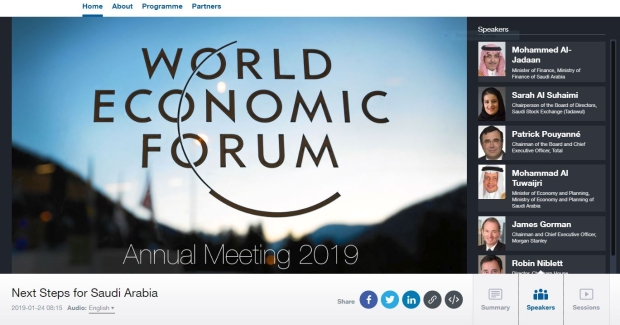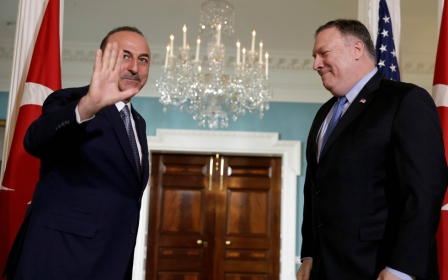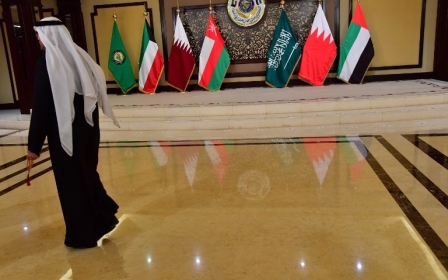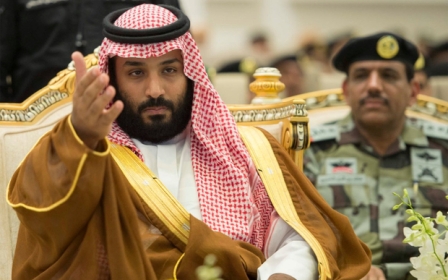'Geopolitical headwinds': Davos event accused of airbrushing Saudi abuses
Three months ago, an investment conference in Saudi Arabia dubbed ‘Davos in the Desert’ was accused of whitewashing the murder of Jamal Khashoggi.
Now, an event at its original Swiss namesake has drawn accusations of doing the same.
On Thursday, the World Economic Forum (WEF) in Davos will host an event titled ‘Next Steps for Saudi Arabia’.
“Saudi Arabia's national transformation plan encountered geopolitical and economic headwinds in 2018,” the description on the WEF website says.
“How will the country respond to a new global and regional context?”
Saudi Arabia has indeed faced difficulties in recent months, with a number of shocking developments drawing negative attention to the kingdom’s rulers.
Among the so-called “geopolitical and economic headwinds” Riyadh “encountered” is the assassination and dismemberment of journalist Khashoggi in the Saudi consulate in Istanbul, an operation the CIA concluded was almost certainly signed off by Crown Prince Mohammed bin Salman.
Since this isn’t ‘Davos in the Desert’, it’s pretty strange that this Davos Forum is brushing over the shocking developments in Saudi Arabia over the past year
- Sarah Leah Whitson, HRW
Other areas of contention include the conflict in Yemen, where Saudi Arabia is accused of war crimes, and the detention and reported torture and sexual abuse of women rights activists.
These developments, and more, have tarnished the image of the Saudi leadership and drawn condemnation from many of the country’s allies.
Yet the WEF is brushing over them, Human Rights Watch’s Middle East and North Africa director Sarah Leah Whitson told Middle East Eye.
“Since this isn’t ‘Davos in the Desert’, it’s pretty strange that this Davos forum is brushing over the shocking developments in Saudi Arabia over the past year,” said Whitson.
“As if hundreds of the country’s business and media leaders weren’t just arbitrarily jailed – with some tortured, one killed – and forced to forfeit their assets in a massive shakedown of $100bn, outside of any apparent legal process.”
“Rather than holding Saudi officials to some modicum of accountability for the country’s outrageous assaults on its citizens,” she added, “WEF seems to be helping them normalise a very abnormal, condemnation-worthy, state of affairs.”
Morgan Stanley attendence uncertain
Originally, the panel of speakers included Riyadh’s Economy and Planning Minister Mohammad al-Tuwaij and Finance Minister Mohammed al-Jadaan, Morgan Stanley’s CEO and Chairman James Gorman, a Saudi business leader and an analyst from London-based think-tank Chatham House.
However on Wednesday, following a request from MEE to comment on Gorman's participation, the investment bank said it had contacted the WEF and demanded his name be taken off the list of speakers.
Hugh Fraser, a Morgan Stanley spokesman, said MEE’s email had caused “great consternation” and Gorman had never agreed nor confirmed he would appear on the panel.
Later in the day, however, his name remained on the event listing, with the new addition of Patrick Pouyanne, chairman and CEO of oil giant Total.
“Perhaps the Saudi commentators can advise business leaders how they can protect themselves from being Mohammed bin Salman’s next targets, and evade being kidnapped or chopped up in a Saudi consulate if they try to leave the country,” Whitson said.
Saudi Arabia has past form when it comes to acrinomy at major economic conferences.
In October, days after Khashoggi was murdered, Riyadh hosted the Future Investment Initiative, a conference commonly referred to as ‘Davos in the Desert’.
As it became increasingly clear top Saudi officials lay behind Khashoggi’s disappearance, world and business leaders pulled out.
The crown prince’s international standing and the development of his signature Vision 2030 economic plan appeared under threat.
However, Christian Henderson, a Middle East political economy expert said that the Davos event did not signal that all was forgotten.
“Obviously the private sector is keen to get into Saudi, but I don't think this event means that all reservations have been dropped,” he told MEE.
“Do they even need the approval that might be manifest in such meetings to engage with the kingdom?”
The WEF had not responded to a request for comment at the time of publication.
New MEE newsletter: Jerusalem Dispatch
Sign up to get the latest insights and analysis on Israel-Palestine, alongside Turkey Unpacked and other MEE newsletters
Middle East Eye delivers independent and unrivalled coverage and analysis of the Middle East, North Africa and beyond. To learn more about republishing this content and the associated fees, please fill out this form. More about MEE can be found here.





